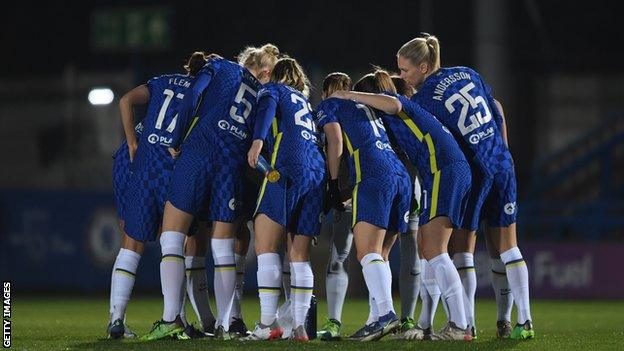Maternity pay: Professional female players in England to receive improved terms
- Published

Chelsea boss Emma Hayes has previously spoken about the lack of support for female players who have children
Players in the top two tiers of women's football in England will receive improved maternity pay as part of a new agreement.
From next season clubs in the Women's Super League and Championship will pay full wages for the first 14 weeks of maternity leave and then statutory pay.
The current minimum is for clubs to pay statutory maternity salary.
Clubs must meet the requirements as part of their license agreement with the Football Association.
There are also updated terms for injury and illness and termination of contract for long-term injury - which will apply to new deals or if clubs agree to improve contracts early - while the maternity agreement will automatically apply to all players from next season.
Previously, players received six months' pay if an injury occurred but they will now get their basic wage for the first 18 months, then one half of it for the total length of the injury.
Clubs also previously had the right to serve a player notice of three months if they had to end a contract as a result of an injury or illness that has kept them out for 18 months. This has been increased from three months to 12.
The FA and PFA announced last week they had reached an agreement to include maternity and long-term sickness cover for the first time.
The FA's director of the Women's Professional Game Kelly Simmons said: "I am delighted we have been able to put this agreement in place and it is another significant step forward for the women's game.
"Player welfare and wellbeing has always been our number one priority and this new policy ensures players are better supported, whether that's going on maternity leave or as a result of a long-term injury."
The National Women's Soccer League Players Association in the United States has reached the first collective bargaining agreement in the history of the league.
The key measures agreed include a 160% increase in the minimum salary to $35,000 (拢25,925) a year, up to six months paid mental health leave and eight weeks paid parental leave.
Chelsea manager Emma Hayes welcomed the announcement and called it a "positive step", but feels there is still more work to be done.
"This was long overdue and I think the drive from Fifpro all the way down through the system was really, really needed in the women's game," Hayes said.
"It is just another step in the right direction. We've got so much catching up to do in our game, whether that be about the opportunity, whether that be about provision behind the scenes - I think this is needed across the global game, not just in England.
"I think that Fifpro are trying to put in place basic standards, basic minimums across the globe that I think is absolutely needed to protect the rights of women in football."
No Passion, No Point: Adam Peaty reveals what he's had to sacrifice in pursuit of Olympic gold
The truth behind 'The Purple One': Will Prince now be known as evil or genius?